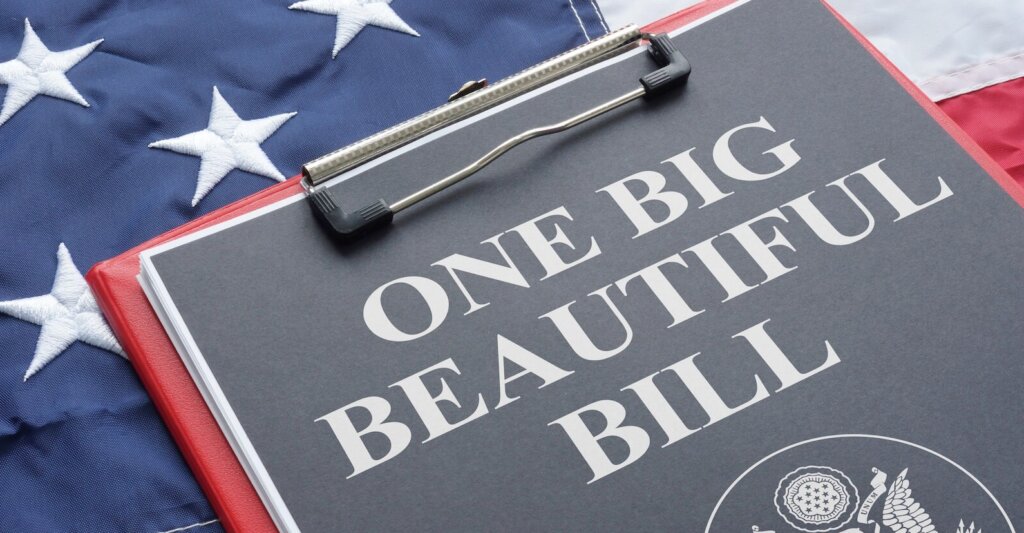
On July 4, 2025, President Donald Trump signed into law the One Big Beautiful Bill Act, a sweeping piece of legislation that reshapes the American tax code. At its core, the bill makes permanent many of the tax cuts originally enacted in the 2017 Tax Cuts and Jobs Act (TCJA). However, the bill also makes significant tax reform that affects individuals, businesses, and estates. Here we provide a summary of developments for taxpayers to consider.
Permanent Lower Tax Rates and Higher Deductions
The bill makes permanent the TCJA’s reduced individual income tax rates and bracket changes, preventing a scheduled tax hike in 2026. The bill locks in the standard deduction at higher levels – $31,500 for joint filers, $23,625 for heads of household, and $15,750 for single filers – indexed for inflation.
Elimination of Tax on Tips and Overtime
One of the most talked-about features is the elimination of federal income taxes on tips and overtime pay. The bill temporarily makes up to $25,000 of tip income for individuals in traditionally and customarily tipped industries and $12,500 ($25,000 for joint filers) of qualified overtime compensation deductible for tax years 2025 through 2028; with the deduction phasing out when adjusted gross income exceeds $150,000 ($300,000 for joint filers). This provision aims to benefit service industry workers and those in hourly wage jobs, offering them a tangible increase in take-home pay.
Expanded Benefits for Seniors and Families
Seniors aged 65 and older will see a temporary deduction of $6,000 for each qualifying individual for both itemizers and non-itemizers that phases out when modified adjusted gross income exceeds $75,000 ($150,000 for joint filers), available from 2025 through 2028. Meanwhile, the bill has permanently increased the Child Tax Credit to $2,200 per child, with a refundable portion of $1,700, both indexed for inflation.
SALT Deduction Cap Temporarily Raised
The bill temporarily lifts the controversial $10,000 cap on state and local tax (SALT) deductions to $40,000, with 1% annual increases through 2029. However, this benefit phases down for taxpayers earners with AGI above $500,000. This change offers temporary relief to taxpayers in high-tax states.
Business Tax Incentives and Depreciation
For businesses and entrepreneurs, the bill increases the Section 179 expensing limit from $1.25 million to $2.5 million, allowing for greater investment in equipment and infrastructure. Another key depreciation provision is the reinstatement of 100% first year “bonus depreciation” for qualified property acquired and placed in service after January 19, 2025. The bill also makes the 20% Qualified Business Income (QBI) deduction permanent.
Estate and Gift Tax Exemptions
The bill has permanently increased the estate and gift tax exemptions to an inflation-indexed $15 million for single filers and $30 million for joint filers, beginning in 2026.
Deduction for Car Loan Interest
For tax years 2025-2028, the Act provides a deduction up to $10,000 on car loan interest for vehicles assembled in the U.S., subject to income-based phaseouts.
Expanded Use of 529 Plans
This legislation significantly increases the options for how taxpayers can use 529 plans, after previous tax law mostly limited options to qualified higher education expenses and contributions up to $10,000 annually for K-12 tuition. The One Big Beautiful Bill will allow up to $20,000 annually tax-free withdrawals for K-12 curriculum, books, online resources, tutoring, and educational therapies for students with disabilities. Dual enrollment fees for college courses and withdrawals for standardized testing fees, tuition and materials for certificate programs, trade schools, and other credentialing programs recognized under federal law will also be tax free.
Repeal and Phase-Out of Green Energy Credits
The One Big Beautiful Bill Act terminates the eligibility of wind and solar projects placed in service after December 31, 2027 for Clean Electricity Investment Credits, with an exception for wind and solar projects that begin construction within twelve months of enactment of this legislation. The Act also terminates various clean energy credits, including the Clean Vehicle Credit, Alternative Fuel Vehicle Refueling Property Credit, the Energy Efficient Home Improvement Credit, and the Residential Clean Energy Credit.
Planning Ahead
For taxpayers, the One Big Beautiful Bill offers both opportunities and challenges. Financial strategies may need to be reassessed to reap the greatest tax benefit. Consult your AHP tax professional and how we can help to review tax planning in light of the new law.